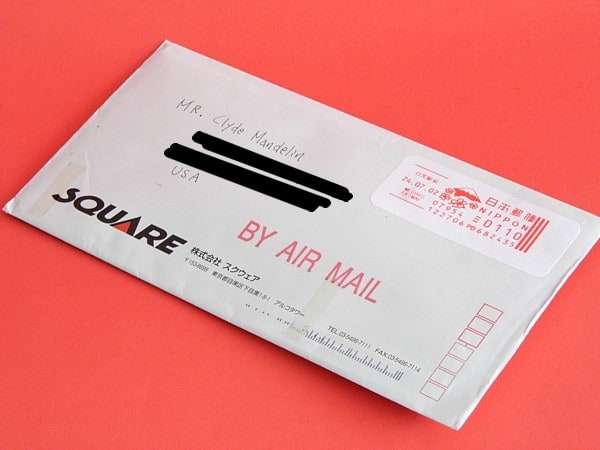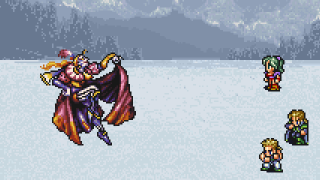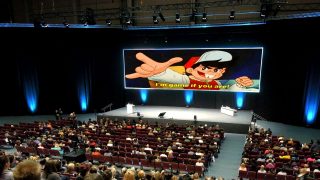Joey asked a question recently that I’ve gotten every so often over the past 10+ years, so I figured it’s time to write up something about it!
Has the fact that you’ve participated in technically-not-entirely-legal fan translations and the like ever caused problems for you professionally? I notice that those projects aren’t listed on your resume (unless the resume I’ve got in mind is super old, which is certainly possible), but are listed on your plain-for-all-to-see personal website.
I ask partially because a decent portion of the amateur VA work I’ve been getting has been in fandubs and other fan projects.
The quick answer is that no, it’s never been much of an issue as far as I can tell. Obviously I wasn’t on the hiring side of the equation so I suppose it’s possible, but it doesn’t seem to have caused any major problems from my perspective, except for maybe one misunderstanding.
I could probably write up huge, multiple articles on the subject, but for now I’ll just give a few tidbits of info.
Fan Translators and Professional Translators
One thing I guess a lot of people don’t realize is that the difference between a fan translator and professional translator isn’t that big – it’s mostly just a matter of experience level. People who get into professional translation usually always start out doing it for fun or as a hobby or whatever. In fact, I’m completely serious when I say that every professional translator I’ve ever known has started out as a fan translator. And that’s including acquaintances who don’t translate entertainment and counting acquaintances who don’t even translate to/from the same languages as me!
I think this is because like a lot of specialization-based or art-based careers, it’s pretty rare to just randomly “fall” into this kind of job. Usually someone will find that they like translating or sharing stuff from other cultures, so they’ll translate stuff they enjoy. Then, eventually, they’ll turn that fun hobby into a paying career. Much like, say, film-making or sculpture or football or something, where you’d expect a professional to have done tons of early, personal projects or whatever for fun.
As such, I think most translation/localization managers expect job applicants to have done personal projects for experience or fan enthusiasm. It’s just sort of normal. In that sense, I don’t think having or mentioning your personal projects is a bad thing. And when you’re just starting out in the professional world, it might be ALL you have to show – that’s how it was for me, anyway.
Relying on Fan Translation Projects at First
As I already covered in a previous article, I had fun translating video games for fun, so I decided that was what I wanted my career to be. So around the time I graduated with my degree in Japanese, I started looking for video game translation work. I had done a lot of fan translation projects to gain experience and build a portfolio, but I was still a little naive about how the real world worked and how video game translation was handled in the real world, so I met with a lot of rejection letters and e-mails. I’ll save the details of all that for another time; right now I’ll focus on them in the context of “did my fan translation portfolio hurt or help?”
Square (Japan)
I was a huge fan of Square games (I don’t think it was Square-Enix at this time) so I applied for a contract position in Japan. I think I got far enough along in the process – I even had to write a fanfic as part of it. I’m pretty sure I included a sheet listing a bunch of the fan translation projects I worked on, the difficulties each project presented, and how I handled them. I don’t think including this hurt me – if anything, it probably helped demonstrate my enthusiasm and competence. But I didn’t make the cut for that hiring period. Looking back, I think the fact I wasn’t actually in Japan and the fact I had no professional experience were the biggest detrimental factors. So I got the good ol’ rejection letter, saying to try again next month or something like that:
 |
In fact, I think one of the producers on the Front Mission series was actually impressed and glad that fans had translated some of the unreleased stuff on their own (more here), so I get the feeling that having a fan translation background wasn’t a terrible thing to admit to, at least for Square. And when I worked on the MOTHER 3 translation I got encouraging e-mails from translators/localizers inside several companies, including Square-Enix.
Square (USA)
Around the same time, I think I saw a vague Square job posting for some localization-related position in California. It definitely felt like something I had little chance of landing; I think they wanted 5+ years of localization producer experience, voice-over directing experience, stuff like that. I figured I sort of had that, having headed a number of large fan translation projects and even spearheading (but ultimately failing) an optional dub patch for the Star Ocean translation. But I felt it was better to apply and fail than possibly miss an opportunity, so I sent a packet of stuff their way. And in this case I actually do think my fan translation stuff might’ve been a detriment.
I had just done a fan translation of the Wonderswan version of Final Fantasy, so I had included some bits from it as samples of my work. I think I got a generic e-mail rejection a few weeks later, saying something like, “Unfortunately, I don’t think we would make a good match at this point in time.” Which was totally understandable, as I didn’t have years of professional localization producer experience to begin with. But years later, I think I read from someone working there that they had sometimes received job applications from people that included re-translations of existing Square translations, which made him think, “Why would we ever hire you if you’re basically saying our current work sucks?”
That wasn’t what I was going for, though 🙁 So I think that’s one of the few times my fan translation work wasn’t beneficial. So use this as a tip, future translators! Don’t use samples from the company you’re applying to – you could end up giving the wrong impression!
Nintendo, Part 1
One day I got an e-mail (or was it a phone call) from a “headhunter” – someone from a hiring agency who actively tries to find employees for companies. She had seen my online resume, which at the time mostly listed my fan translation work as I hadn’t yet gotten any professional work. She explained that she was trying to fill a localizer position at Nintendo of America and that she had been impressed by my resume. When I mentioned that all the games listed on there weren’t official translations she seemed a little less excited, but she felt it was still a strong enough background for someone just starting out. I don’t remember why this didn’t work out, I’ll have to go dig around some old hard drives or something for those e-mails. It was probably because my spoken Japanese was getting rusty.
In any case, it seemed like my fan translation work wasn’t necessarily considered a “bad” thing, but how beneficial it was or would’ve been isn’t clear. I doubt this would’ve worked out anyway, though, due to the lack of professional experience. It was that age-old problem of “how am I supposed to get professional experience in the first place if no one will hire me?” That’ll probably be a topic all its own in a future article.
Other Places?
I’m pretty sure I applied to other companies too but the fact I don’t remember clearly means they probably never got back to me. I assume I applied to other game companies like Capcom, Konami, and such. Maybe my applications got absorbed by the darkness.
Eventually, since I wasn’t getting any good responses from anyone, I decided, “Since no one will hire me, I’ll just take charge and get work for myself.” So being the naive, straight-out-of-college guy I was, I started a little translation “company” for a month or two. Nothing much came from it, but maybe I’ll talk about that experience some other time.
FUNimation
One of the other places I had applied to was the anime distributor FUNimation. I didn’t hear anything for months so I just assumed my application was absorbed in the darkness there too. But months later I got a response, hooray! Again, the details might be better saved in an article of their own, but it sounds like what really helped me get the job was the fact that I already had familiarity with subtitles and subtitling software.
During those few months after college, I sometimes subtitled Japanese TV shows for friends in an IRC channel I used to hang out on. I tossed some quick info about that on my resume/portfolio, and I guess it helped!
Years later, I read somewhere online that the president of the company said something about respecting the high-quality fan translation work done in the gaming community. Did he really say that? Was that a reference to me? I dunno, but it’d be cool if that was the case! Either way, I think my portfolio either had no bearing in getting the job, or it helped. I don’t think it hurt it in this case.
Later On
For the most part I didn’t do much fan translation work after this point, but the MOTHER 3 project did attract a good amount of attention from professionals all over. Translation staff members from various companies sent me nice e-mails, and I even did get asked a few times to take some translation tests to get in various agencies’ pools of translators. It was a cool, crazy time, and it made me think that if there ever was a stigma regarding unofficial translation work, it’s not as strong as it might’ve been before.
Summary
So that’s a quick look at my experience with my fan translation work mixing with the professional world. By this point, like 11 or 12 years after all that, I don’t really need to point at my fan translation work anymore; I’ve done so many professional projects that it would just make things all the more tedious. My online resume is way out of date (and I’m considering taking it down), but I include both my professional and my hobby work here just for reference for anyone who happens to find it.
Getting your foot in the door is probably always going to be a little rough, whether you’re a translator or a voice actor or artist or whatever else. But if you keep at it and try to make yourself stand out somehow – like with unofficial work, for example – you’ll probably accomplish it eventually. I’d like to go into more detail about the job hunt process for translators someday so that future translators can avoid some of the pitfalls I ran into. But that’s another topic for another time!
Your Experiences
My own take on this subject is very limited in scope, so I’d love to hear from other translators. Did you include a portfolio of amateur work when you first started out? Did you used to do unofficial/fan translation before making a career out of it?


![press start to translate [Final Fantasy IV] press start to translate [Final Fantasy IV]](https://legendsoflocalization.com/wp-content/uploads/2019/08/bbenma.png)



So, question: how did you exactly fan translate games? I would really like to start on a Pokemon game or something. But as far as I know, there’s a level of programming involved as well, because (with Pokemon at least) English letters aren’t already in the game. I could figure out how to re-texture the Japanese with English letters, but I wouldn’t know how to retype the text. Did you work alongside a programmer?
I guess a relevant question would be how you figured out subtitle programs. I have no idea where I would start.
Well, I was already familiar with how to hack ROMs, but for most of my early fan translations I just worked with more skilled hackers/programmers. They’d either need translation help or I’d need programming help. romhacking.net has a lot of useful resources and documents on how to learn to hack and translate games – here’s a good starting point: http://www.romhacking.net/start/
Like a lot of things, it might take a little learning to get started, more than you’d like, but once you get over that initial hump you’ll be able to do all sorts of stuff.
For subtitle programs, I actually just learned how the .ssa file format worked back in the old days and then made custom programs that created/modified them in whatever way I needed. Nowadays you can use things like Aegisub which really simplifies things.
I was already in SQEX’s system for a couple of years when they approached me for Kingdom Hearts II, and the other J-E translator on the job said he specifically wanted me in part because of my fan-translated SQEX song lyrics (KH2 having some original songs that needed singable English versions). So even seemingly random fan projects can make a positive impression and lead to solid work.
Ooh, cool! That’s really neat to hear, thanks!
So is there a Nintendo Part 2?
There is, but it doesn’t really apply to this post. I might talk about it some other day, although I don’t think there’s much to say about it. Maybe it’ll help some people possibly get into Nintendo someday though I guess.
Just “Joey”, eh? Are we on a first-name basis now?
Anyway, thanks! That was very informative and interesting. There was one reason I asked this, though, that I didn’t really see brought up in too much depth: Whatever stigma there is, I was actually wondering less about the implied or inferred quality of amateur work, and more about the message sent by what can pretty easily be argued is complicity in piracy.
I don’t imagine anybody would care too awfully much about fans doing stuff with older works or other works that the owner of the IP can’t or won’t make (much) money on (MOTHER 3 jumps to mind there), but I would think it would look pretty unsavory for someone to cite their work in something where the case could be made that they may have actually cost the rights holders money. Fandubs, for example. I assume that participating in a fandub of something super-recent, or that may not even officially exist in the target language yet, would have some pretty ugly baggage attached to it that doing the exact same thing with a work from 20 years ago may not. It’s been one of the things I’ve kept in mind when choosing roles to audition for, since I eventually plan on at least trying to pursue voice acting professionally.
Is there anything to that, would you say?
Ah, well I think it’s not as big of a deal as one might expect, unless the person in question makes a big deal out of it. I think whoever’s doing the hiring won’t care too much about the legality of stuff – they’re just more interested in filling the position that needs filling.
This also sounds a bit like Nora’s own experience above, where she’d done some unofficial translations of Square Enix stuff, and that led to some work for Square Enix work in an official capacity.
My hunch says not to worry about it too much – I don’t think there’s a “project police” out there. Just as long as you don’t say, “Hey! I loooove illegal work! I looove sticking it to the man and screwing with your profits! Now hire me, bozo!” I actually think you’ll be just fine.
“I think whoever’s doing the hiring won’t care too much about the legality of stuff – they’re just more interested in filling the position that needs filling.”
That makes sense. Also, now that I think about it, it would be a little weird to hold it against someone expressing a genuine desire to do legitimate, legal work that they had to make do with other means for the sake of building experience and the like.
I always find learning these things to be quite informative. Stuff like this was covered on ANN a few times, but it’s great to hear it from other places too.
I wish hacking a game could be simple. xD It would be cool to translate some game into English just for kicks as a test of my hacking/Japanese skills. Of course, that would take knowledge of how to hack games, as well as more than just Japanese I’ve picked up from watching years of subtitled Anime (By now I’m even able to spot shoddy translations sometimes, which is really cool. None of my local colleges offer Japanese courses, though, which is really a huge shame to me). Even if said game was already in English. Like… Metal Gear. I could improve the original translation or something. :p Although I think the terrible translation is one of the things that people have come to know and love about that game over the years…
I’m currently twenty years old working a minimum wage job trying to figure out what I want to go to college for, most most of the things I’m interested in/have the skill set base for are things like music and writing, which are VERY tough fields to get into. It’s kind of a really tough thing. :\
It’s not hard to learn how to hack games, you could probably get most of the basics down pat in just a week or two. Like with any skill, you just gotta put in the constant time and effort to reap the benefits from it.
I’d love to start a tutorial page/site for learning Japanese and/or how to hack and translate video games. I think my writing style could make it pretty easy to pick up. But I have so little time as it is that the best I can really do now is point to things like this: http://www.romhacking.net/start/
To be honest as someone who has contributed code patches and documentation for translation projects I would say the translating part is harder than the hacking part. Even native/assembly code is designed to be regular and logical, and most programmers don’t write hacky/broken/incomprehensible code without a reason. (No clue what the MOTHER3 programmers were on.) Human languages are, in contrast, NOT organized or straightforward. It’s much easier to learn Gameboy Z80 than Japanese.
Hmm…
I did a delocalisation and restoration patch for Final Fantasy Legend II back in 2010 (which can be found here: http://www.romhacking.net/hacks/683/) but when I looked back on it recently, I found that it has many spacing issues that I’m not sure how I could have caused. When I was editing the hex, I don’t recall finding any pointers that seemed to indicate how many spaces would be allotted in a specific part of a specific sentence.
Do you have any idea what might have happened?
I don’t think I fully understand, but if it worked fine before but doesn’t now, it might be that emulation has improved/become more accurate since then. I know a lot of old game translation patches don’t work with recent emulators because of this phenomenon, some of my own, in fact.
I would like it if you did that. I considered making a fan translation but have zero experience with ROM hacking or any kind of Hacking/Programming. I have looked on romhacking.net but it looked very complicated and it haven’t given me an idea of what I should learn and in what order. If you could give a clear explanation that would be very helpful. Then i could also see if I really can fan-translate a game after 2 weeks.
This is a bit late, but I have *never* come across companies thinking that fan translations, etc. are a bad thing. If anything, it comes off as the opposite: “Wow, this guy translated/localized games for free?! Just imagine how hard he’ll work when he actually gets *paid*!”
Obviously, I think some stuff to back up that you actually know Japanese is a plus (JLPT certificate, studying/working in Japan, etc.), but, like I said, I think most companies appreciate the passion that you would bring to the table.
Been reading through (and commenting on) a bunch of other pages here, and just wanted to say:
I think you’re a real mensch. An upstanding guy who really tries to make the world better, helping people out from the goodness of his heart. Dude, yer awesome. Thumbs up.